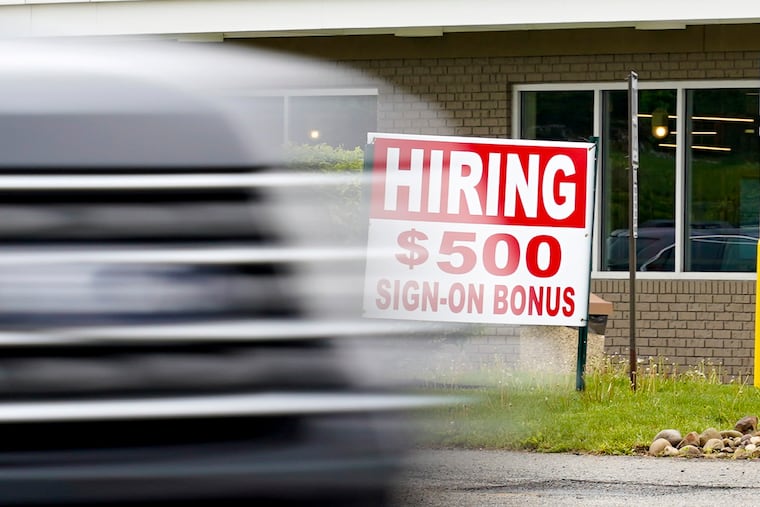Don’t believe it when people say ‘no one wants to work anymore’ | Jenice Armstrong
I don’t deny that some people are bums who would rather play Fortnite and wait on a government check than go out and work for a living. But it's not everybody.

The belief that “no one wants to work anymore” is trash.
It’s a classist trope and a gross oversimplification.
I don’t deny some people are bums who would rather play Fortnite and wait on a government check than go out and work for a living.
But it’s not everybody.
You wouldn’t think that, though, from the way some employers complain that they can’t find enough hourly workers to fill certain positions.
If they are really serious about wooing workers who may be sitting at home collecting unemployment compensation plus $300 a week in a federal stimulus subsidy, they need to find ways to make it worth people’s while.
Otherwise, you can’t blame workers for living on unemployment compensation as they explore their options until the $300 federal subsidy expires in September.
“What we should be having a conversation about is, ‘Why is it that people are making more money sitting at home than they would have if they went to work?’” State Rep. Jordan Harris (D., Phila.) said earlier this week. “That’s the real conversation. … It’s called raising the minimum wage.”
More than 20 states have blocked residents from receiving the $300 weekly federal supplement included in President Joe Biden’s $1.9 trillion American Rescue Plan, according to the Associated Press. Also, beginning in July, Pennsylvania will reinstate work-search requirements for people on unemployment.
I have zero sympathy for corporations that can’t find enough frontline workers to sling burgers.
I do, though, for hardworking local employers such as Philly-based Faulks day care. Owner Rowena Lynne-Jones Faulk has been advertising for three positions she has open but can’t find anyone interested in accepting the jobs that start at $10 an hour, depending on an applicant’s education level.
“At this point, no one wants to work because the PUA [Pandemic Unemployment Assistance] is more than the salary,” she told me. “We can’t just pay people $20 an hour to be a child-care aide or child-care teacher.”
I met her on South Philly activist Anton Moore’s Facebook wall, which was hopping earlier this week after he raised the issue by writing, “Please tell me something is it me or is it that some people really don’t want to work? Unbelievable … and it has nothing to do with low wages.”
“I’ve had opportunities for people and people just didn’t show up,” Moore told me after I called him. “You’ve got jobs … hiring who can’t find people.”
I believe him and his followers. There are a whole lot of folks who don’t want to work and would rather sit back and collect unemployment. I’ve heard it from too many people not to believe it’s true.
I wish, though, that critics would direct the same negative energy toward CEOs who pay themselves multimillion-dollar salaries but refuse to pay their workers a decent wage.
McDonald’s CEO Chris Kempczinski last year earned a whopping $10.8 million in overall compensation, which includes stock, salary, and other forms of payment. That’s 1,189 times higher than that of the median McDonald’s employee, who made $9,124 last year, according to CNBC.
I’m glad some unemployed workers have been using what leverage they have to fight back and refuse to work for what’s essentially chump change. Things are changing. McDonald’s recently announced plans to hike the salaries of employees in its 650 company-owned stores. Other major chains have taken similar steps.
As for those who choose not to work, we can’t assume it’s because they don’t want to.
“Have we spoken to people and asked: ‘Why is it that you don’t want to go into the workplace? What’s your apprehension?’” said Chad Dion Lassiter, executive director of the Pennsylvania Human Relations Commission. “Remember, essential workers were saying, ‘Yo, I’m up in here and they don’t even have masks for me.’ So some of that is part of it. We just can’t leave it with, ‘Oh no, they don’t want to do it.’ We have to look at it and simply say, ‘What has the impact of the coronavirus global pandemic had on you?’”
Meanwhile, University of Pennsylvania economist Ioana Marinescu has been studying the issue and has a unique compromise that could help push workers back into the job market: Allow workers to continue getting the $300 weekly federal supplement even after they start working again.
“That would cost nothing for the state of Pennsylvania,” Marinescu explained. “But for the worker, it’s like a bonus. They could go back to work and get that $300 a week or as much entitlement as they have remaining. That would be a little bit of a win-win. If they can’t find a job, they can still collect the benefits.”
Sounds like a workable idea to me.